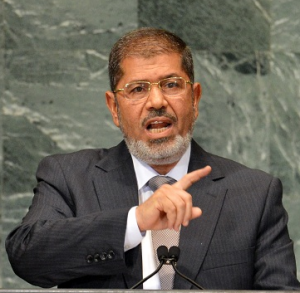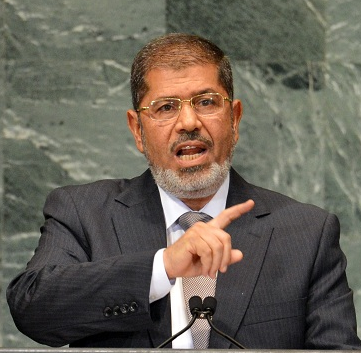
AFP PHOTO / STAN HONDA
President Mohamed Morsy is set to meet Uganda’s President on Tuesday in an attempt to bolster relations between both nations, as Uganda marks its fiftieth anniversary of independence.
According to the official state news agency MENA, this marks the “early stage of a long history of positive relations which will be based on mutual understanding, friendship and common development cooperation.”
Morsy will meet several African presidents during his two-day visit to Uganda, his spokesperson Yasser Ali said on Sunday. According to the statement released on MENA on Monday, Morsy is not only meeting the Ugandan President Yoweri Museveni for the celebrations, but is also set to meet South Africa’s Jacob Zuma, Zambia’s Michael Chilufya Sata and Hassan Sheikh Mohamud of Somalia in an effort to bolster Egypt’s relations with African nations.
According to Ali, the government plans on initiating several programmes sponsored by the Foreign Ministry African Development Fund as well as joint ventures with African states. This trip is Morsy’s second trip to an African nation since he came to power; the first being his brief stop at the African Summit which was held in Ethiopia in July.
There have been several critics of Morsy’s nine trips to eight separate countries so far, yet Morsy defended his itinerary during his impassioned speech on Saturday by pointing at the various investment opportunities he has created. So far Morsy has managed to garner substantial investments from China and looks to be attempting to foster good relations with the Nile Basin countries, such as Uganda.
Relations between many of the Nile Basin countries have often been strained, due to Egypt’s domination of water resources. Under the agreement signed in 1929 between Britain and Egypt, 55 billion cubic metres of water from the total 85 billion cubic metres is meant for Egypt.
The rest is divided between Sudan, South Sudan, Ethiopia, Burundi, Rwanda, Congo, Tanzania, Kenya and Uganda. Upstream nations must also clear any project involving the Nile water, such as hydro-electric dams, with Egypt first, which has a veto over Nile projects.
In 1999 the Nile Basin Initiative was signed amongst the Nile Basin nations, creating a framework for dialogue but falling short from making significant advances for most nations. In 2010 Uganda, Ethiopia, Kenya, Tanzania and Rwanda signed the Cooperative Framework Agreement to work towards attaining a greater share of the Nile water.
This move was strongly objected to by former President Hosni Mubarak. Sudan and Egypt have both voiced their displeasure at the deal and have not signed the agreement.
In August, leaked cables from the security company Stratfor, from 2010, revealed Egyptian officials had allegedly struck a deal with the Sudanese President Omar Al-Bashir, allowing Egypt to station commandos in Sudan and the construction of an airbase in the Kursi region as a relay point for possible air strikes on hydroelectric facilities on the Blue Nile. The cables also mentioned that such a strike would only be a last-ditch attempt should negotiations fail.


